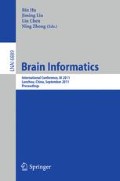Abstract
Cognitive architectures allow the emergence of behaviors in autonomous agents. Their design is commonly based on multidisciplinary theories and models that explain the mechanisms underlying human behaviors, as well as on standards and principles used in the development of software systems. The formal and rigorous description of such architectures, however, is a software engineering practice that has been barely implemented. In this paper, we present the formal specification of a neuroscience-inspired cognitive architecture. Which ensures its proper development and subsequent operation, as well as the communication of its operational and architectural assumptions unambiguously. Particularly, we use the Real-Time Process Algebra to formally describe its architectural components and emerging behaviors.
Access this chapter
Tax calculation will be finalised at checkout
Purchases are for personal use only
Preview
Unable to display preview. Download preview PDF.
References
Anderson, J.R., Lebiere, C.: The atomic components of thought. Lawrence Erlbaum Associates, Mahwah (1998)
Hinchey, M., Bowen, J.P., Rouff, C.A.: Introduction to formal methods. In: Rouff, C., Hinchey, M., Rash, J., Truszkowski, W., Gordon-Spears, D. (eds.) Agent Technology from a Formal Perspective. NASA Monographs in Systems and Software Engineering, pp. 25–64. Springer, Heidelberg (2006)
Kandel, E.R., Schwartz, J.H., Jessell, T.M.: Principles of Neural Science, 4th edn. McGraw-Hill, New York (2000)
Laird, J.E.: Extending the soar cognitive architecture. In: Proceeding of the 2008 Conference on Artificial General Intelligence, pp. 224–235. IOS Press, Amsterdam (2008)
Langley, P., Laird, J.E., Rogers, S.: Cognitive architectures: Research issues and challenges. Cognitive Systems Research 10(2), 141–160 (2009)
Newell, A.: Unified theories of cognition. Harvard University Press, Cambridge (1990)
Rodríguez, F., Galvan, F., Ramos, F., Castellanos, E., García, G., Covarrubias, P.: A cognitive architecture based on neuroscience for the control of virtual 3D human creatures. In: Yao, Y., Sun, R., Poggio, T., Liu, J., Zhong, N., Huang, J. (eds.) BI 2010. LNCS, vol. 6334, pp. 328–335. Springer, Heidelberg (2010)
Wang, Y.: The real-time process algebra (rtpa). Annals of Software Engineering 14(1-4), 235–274 (2002)
Wang, Y.: Software Engineering Foundations: A Software Science Perspective. Auerbach Publications (2008)
Author information
Authors and Affiliations
Editor information
Editors and Affiliations
Rights and permissions
Copyright information
© 2011 Springer-Verlag Berlin Heidelberg
About this paper
Cite this paper
Rodríguez, LF., Ramos, F. (2011). Formal Specification of a Neuroscience-Inspired Cognitive Architecture. In: Hu, B., Liu, J., Chen, L., Zhong, N. (eds) Brain Informatics. BI 2011. Lecture Notes in Computer Science(), vol 6889. Springer, Berlin, Heidelberg. https://doi.org/10.1007/978-3-642-23605-1_20
Download citation
DOI: https://doi.org/10.1007/978-3-642-23605-1_20
Publisher Name: Springer, Berlin, Heidelberg
Print ISBN: 978-3-642-23604-4
Online ISBN: 978-3-642-23605-1
eBook Packages: Computer ScienceComputer Science (R0)

